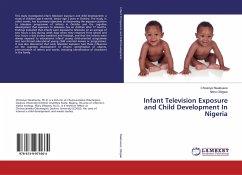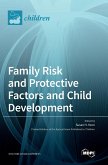This study investigated infant television exposure and child development: a study of children age 6 month- below age 2 years in Onitsha. The study, in other words, has its primary objectives as discovering the exposure pattern to television programme of infants in Onitsha and the cognitive development that exposure to television has on children after 17 months. Findings indicated that infants were exposed to television on an average of two hours a day during week days when they returned from school and four hours a day during weekend and holidays, and that the infants were always exposed to educational infant/ young child-oriented programme and non-formal educational young child oriented movies or programmes. It was also discovered that early television exposure had these influences on the cognitive development of infants; identification of objects, pronunciation of letters and words, including identification of characters in the family.
Bitte wählen Sie Ihr Anliegen aus.
Rechnungen
Retourenschein anfordern
Bestellstatus
Storno








